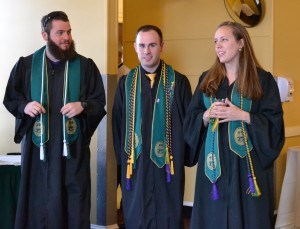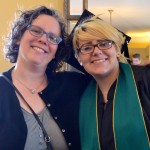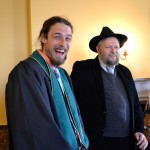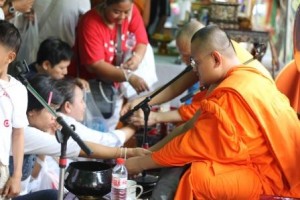 On Sunday, May 18, we celebrated and congratulated our Class of 2014 graduates! Many of these students had been with us from the beginning of their college careers; some had moved from the minor to the major; and others still figured out rather late in the game that they had (surprisingly!) taken enough credits to declare a second major in Religion. However they started, all of them finished strongly, and as a department, we are proud of their accomplishments, and eager to hear what they both take on and achieve next.
On Sunday, May 18, we celebrated and congratulated our Class of 2014 graduates! Many of these students had been with us from the beginning of their college careers; some had moved from the minor to the major; and others still figured out rather late in the game that they had (surprisingly!) taken enough credits to declare a second major in Religion. However they started, all of them finished strongly, and as a department, we are proud of their accomplishments, and eager to hear what they both take on and achieve next.
This senior cohort participated in the REL201: Senior Seminar, and wrote intensive research projects as part of their capstone experience. As in years past, the projects built upon both student’s individual interests and coursework experience in the study of religion–which means they produced projects that ranged in scope, method, and theoretical frameworks. While not exhaustive, here’s a sampling of the topics our graduates covered:
- Buddhist monastic reform movements and nationalism in Thailand
- analytical perspectives on Nigerian Christian deliverance narratives
- UVM’s “Healing Touch” course and its place in the curriculum
- Holocaust narratives and Jewish practice
- social media, religion, and the NFL
The breadth of their projects certainly reflects the breadth of their interests, but it may belie, at quick glance, the depth with which these recent graduates approach the study of religion, in these projects and in their everyday conversations.
And while this statement itself seems a platitude, we’ve spent the better part of four years listening to them hash out their ideas! Believe us: these are students who cannot help but think religion. We hope they’ll keep in touch, we hope some of them will be featured as alumni bloggers soon, but we ask very little–only that they continue to think religion, with breadth and depth, in whatever comes next.



